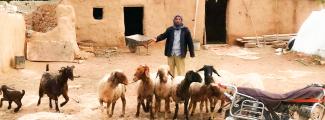Strangers had the unity of a situation: displacement, escaping death, loss and suffering. The village of Um Arquila, in the eastern countryside of Aleppo, was the same as other villages in the same area who had suffered from all above.
Ms. R, 33 years old is a mother of five children, she moved away and then returned after 3 years to live in a mud room at her husband's relatives.
Ms. Kh, a 50-year-old woman. She has six daughters who, after her husband's death, returned to live in her mostly demolished home, working on a small fare to support herself and her children and keep them in school.
Ms. H, 40, has seven children, and lost her husband during the war.
This is the case of women who live in a simple rural society, their largest concern is their homes and their families. But, after their return, the village was no longer the one they used to live in. The people changed and the faces are different. The war ended, but it destroyed most of their homes and loved ones. The destruction of most homes and people is burdened by economic and social difficulties because of the arrival of new families who they do not know.
Mr. S, who is five decades, who lives with his 10 children and his wife. His neighbor, Mr. E lives with his wife and eleven children, two of whom have a disability who can cope, except with the presence of a breadwinner, which requires sufficient money for attention and care.
As part of its role in supporting the material resources, the Syrian Society for Social Development went to the eastern countryside of Aleppo where these and other people were monitored and nominated for a small grant. Taking into consideration the most needed ones. They were given a course in project management for three days and after the approval of the projects, which were about sheep keeping , in view of the nature of the pastoral area and its rapid material return, the beneficiaries received their own sheep and feed.
Day after day, the beneficiaries continue their projects carefully and take care of the sheep without any difficulties, because the region helps them to do so and because of their great knowledge in this area.
Beneficiaries are more able to secure their needs, take care of their children, bring them back to school, maintain their homes and keep their livelihoods and access to resources that will give them a new hope of a decent life.
The village also had its share of the projects. providing the people with sheep products, which is considered a main food after these products did not exist due to poor material conditions for all the villagers, which encouraged some people to return to their places of residence in the village.

